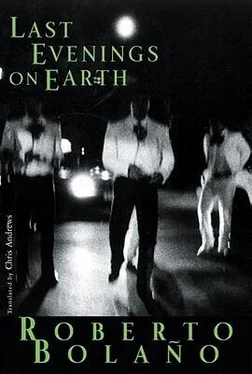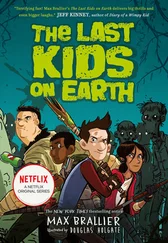How long were you in India? I asked, getting worried.
About a year and a half, said The Eye, I'm not exactly sure.
Once his friend from Paris came to the village. He still loved me, said The Eye, although in my absence he had set up house with an Algerian mechanic who worked for Renault. Telling me this, he laughed. So did I. It was all so sad, said The Eye. His friend arriving in the village in a taxi covered with red dust, the boys chasing after an insect in the dry scrub, the wind, it seemed, bearing good news and bad.
In spite of his friend's entreaties, he did not return to Paris. Months later a letter arrived from France informing him that he was not wanted by the Indian police. Apparently no one had reported the incident at the brothel. This news did not put an end to The Eye's nightmares. The characters who came to arrest and brutalize him simply changed their clothes: instead of policemen, now they were thugs from the sect of the castrated god. Which turned out to be even more horrifying, The Eye confessed, although by then he was used to the nightmares and at some level always knew that he was dreaming, that it wasn't real.
Then the disease came to the village and the boys died. I wanted to die too, said The Eye, but I wasn't that lucky.
After convalescing in a hut that was steadily washing away in the rain, The Eye left the village and returned to the city where he had met his children. He was somewhat surprised to discover that it was not nearly as far away as he had thought; his flight had followed a spiral path, and the return journey was relatively short. On the afternoon of his return, he went to see the brothel where boys used to be castrated. Its rooms had been converted into lodgings for entire families. The corridors he remembered as lonely and funereal were now swarming with life, from toddling children to old men and women who could barely drag themselves along. To him it was an image of paradise.
That night when he went back to his hotel, he wept for his dead children and all the other castrated boys, for his own lost youth, for those who were young no longer and those who died young, for those who fought for Salvador Allende and those who were too scared to fight. Unable to stop crying, he called his French friend, who was now living with a former weightlifter from Bulgaria, and asked him to send him an airplane ticket and some money for the hotel.
And his friend said Yes, of course he would, right away, and then: What's that sound? Are you crying? And The Eye said Yes, he couldn't stop crying, he didn't know what was happening to him, he had been crying for hours. His French friend told him to calm down. At this The Eye, still crying, laughed, said he would do that and hung up. But he went on crying, on and on.
I went to Gуmez Palacio during one of the worst phases of my life. I was twenty-three years old and I knew that my days in Mexico were numbered. My friend Montero, who worked for the Arts Council, had found me a stint teaching a writing workshop in that town, with its hideous name. First, to warm up, so to speak, I had to do a tour of the writing workshops the Arts Council had established in various places throughout the region. A bit of a holiday in the north to start off, said Montero, then you can get down to work in Gуmez Palacio and forget all your problems. I don't know why I accepted. I knew that under no circumstances would I settle down in Gуmez Palacio. I knew I wouldn't stick to running a writing workshop in some godforsaken town in northern Mexico.
One morning I left Mexico City in a bus packed to capacity and began my tour. I went to San Luis Potosн, Aguas-calientes, Guanajuato, Leуn — not necessarily in that order; I can't remember which town came first or how long I spent in each. Then Torreуn and Saltillo. I went to Durango as well. Finally I arrived in Gуmez Palacio and visited the Arts Council offices, where I met my future students. I couldn't stop shivering in spite of the heat. The director, a plump, middle-aged woman with bulging eyes, wearing a large print dress featuring almost all of the state's native flowers, took me to my lodgings: a frightful motel on the edge of town, beside a highway leading nowhere.
She used to come and pick me up herself midmorning. She had an enormous, sky-blue car, which she drove perhaps rather too boldly, although generally speaking she wasn't a bad driver. It was an automatic and her feet hardly reached the pedals. Invariably the first thing we did was stop at a roadside restaurant that was visible in the distance from the motel, a reddish bump on the blue and yellow horizon. There we breakfasted on orange juice and huevos rancheros, followed by several cups of coffee, all paid for (I presume) with Arts Council vouchers — not cash, in any case.
Then she would lean back on her chair and start talking about her life in that northern town, her poetry, which had been published by a small local press subsidized by the Arts Council, and her husband, who didn't understand the poet's calling or the suffering it entailed. Meanwhile I chainsmoked Bali cigarettes, looking out of the window at the highway and thinking about the disaster that was my life. Then we'd get back into her car and head off to the main office of the Arts Council in Gуmez Palacio, a two-story building whose only redeeming feature was an unpaved yard with a grand total of three trees and an abandoned or unfinished garden, swarming with zombie-like adolescents who were studying painting, music, or literature. The first time I went there, I hardly noticed the yard. The second time it made me shudder. None of this makes any sense, I thought, but deep down I knew it did make sense and that was what I found unbearably sad, to use a rather hyperbolic expression, though it seemed perfectly accurate at the time. Maybe I was confusing sense with necessity. Maybe I was just a nervous wreck.
I found it hard to get to sleep at night. I had nightmares. Before going to bed, I would make sure the door and windows of my room were securely and tightly shut. My throat kept feeling dry and the only solution was to drink water. I was continually getting up and going to the bathroom to refill my glass. Since I was up, I would check the door and windows again to see that they were properly shut. Sometimes I forgot my fears and stayed by the window, looking out at the desert stretching off into the dark. Then I went back to bed and closed my eyes, but having drunk so much water I soon had to get up again to urinate. And since I was up, I would check all the locks and then stand still listening to the distant sounds of the desert (the muffled hum of cars heading north or south) or looking out of the window at the night. And so on until dawn, when I could finally get some unbroken sleep, two or three hours at most.
One morning while we were having breakfast, the director asked about my eyes. It's because I don't sleep much, I said. Yes, they're bloodshot, she said, and changed the subject. That afternoon, as she was taking me back to the motel, she asked if I would like to drive for a bit. I don't know how to drive, I said. She burst out laughing and pulled up on the shoulder. A white refrigerated truck went past. I managed to read what was written on the side in large blue letters: the widow padilla's meat. The truck had Monterrey license plates and the driver stared at us with a curiosity that struck me as excessive. The director opened her door and got out. Get in the driver's seat, she said. I obeyed. As I gripped the wheel I saw her walk around the back of the car. Then she got into the passenger seat and ordered me to get going.
For a long time I drove along the grey strip connecting Gуmez Palacio and the motel. When I reached the motel, I didn't stop. I looked at the director; she was smiling, she didn't mind me driving a bit further. At the start both of us had stared at the highway in silence. But when we passed the motel she started talking about her poetry, her work, and her insensitive husband. When she had said her piece, she turned on the cassette player and put in a tape: a woman singing rancheras. She had a sad voice that was always a couple of notes ahead of the orchestra. I'm her friend, said the director. I didn't understand. What? I said. She's a close friend of mine, said the director. Ah. She's from Durango, she said. You've been there, haven't you? Yes, I've been to Durango, I said. And what were the writing workshops like? Worse than the ones here, I replied, meaning it as a compliment, although she didn't seem to take it that way. She's from Durango, but she lives in Ciudad Juбrez, she said. Sometimes, when she's going back home to see her mother, she calls me up and I reorganize things so I can go to Durango and spend a few days with her. That's nice, I said, keeping my eyes on the road. I stay at her house — her mother's house, actually, said the director. The two of us sleep in her room, and spend hours talking and listening to records. Every now and then one of us goes to the kitchen to make coffee. I usually take cookies with me, La Regalada cookies, her favorite. And we drink coffee and eat cookies. We've known each other since we were fifteen. She's my best friend. On the horizon I could see the highway disappearing into a range of hills. The night was beginning to approach from the east. Days before, at the motel, I had asked myself, What color is the desert at night? A stupid rhetorical question, yet somehow I felt it held the key to my future, or perhaps not so much my future as my capacity for suffering. One afternoon, at the writing workshop in Gуmez Palacio, a boy asked me why I wrote poetry and how long I thought I would go on doing it. The director wasn't present. There were five other people in the workshop, the five students: four boys and a girl. You could tell from the way they dressed that two of them were very poor. The girl was short and thin and her clothes were rather garish. The boy who asked the question should have been studying at a university; instead of which he was working in a factory, the biggest and probably the only soap factory in the state. Another boy was a waiter in an Italian restaurant, the remaining two were at college, and the girl was neither studying nor working.
Читать дальше












